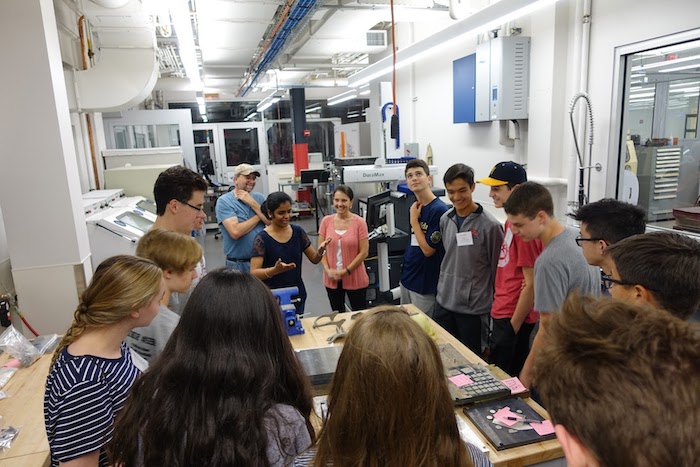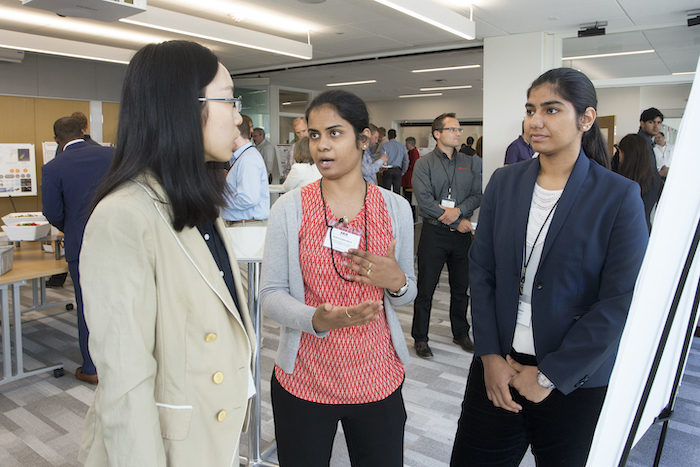Metal 3D printing across scales
New faculty profile: Sneha Prabha Narra
Oct 28, 2021
Additive manufacturing or 3D printing continues to transform the industry by producing parts that are stronger, lighter, and less expensive than those produced by traditional methods. At Carnegie Mellon University, the College of Engineering isn’t just keeping up with the latest technology—we’re defining it. New faculty member Sneha Prabha Narra is one of our engineers shaping this field.
An assistant professor of mechanical engineering, Narra runs the Engineering MaterIals for Transformative Technologies (EMIT) Lab. With a zeal for practical problem-solving, she is eager to bring her experience in manufacturing and materials to both the laboratory and classroom this fall to advance additive manufacturing research and education.
Narra’s area of focus is metal additive manufacturing processes that use powder and wire as the raw material input. In powder-based processes, metal powder is distributed precisely and melted—thin layer by thin layer—by a laser or electron beam until the final piece is completed.

Narra is eager to share her additive manufacturing expertise with students. She joined Carnegie Mellon University's mechanical engineering faculty in 2021.
The sophisticated technology can be a game-changer for sectors like aerospace, medical, energy, and transportation. She wants to advance the knowledge in these processes to enable process qualification and develop processing knowledge to use novel, advanced materials.
Among the wire-based processes, Narra's lab focuses on the wire arc additive manufacturing process. This welding-based layer-by-layer fabrication process can make parts on the order of several meters. This technology is suitable for both repair and manufacturing and offers the potential to drastically reduce material waste and lead time.
Narra is specifically interested in utilizing recent advances in in-situ monitoring, process modeling, and fundamentals of welding to advance the use of wire arc additive manufacturing for new applications and materials.
In the classroom, she is teaching Additive Manufacturing Design and Processing this semester. The course features a project component in which students identify a product and develop designs leveraging 3D printing capability. As part of this project, students also use the polymer printers in the TechSpark maker facility to print their designs.
At a broader level, I want to build on the materials and manufacturing fundamentals to do my part in addressing pressing climate needs.
Sneha Prabha Narra, Assistant Professor, Mechanical Engineering, Carnegie Mellon University
Solving a problem begins with a question
When Narra was an undergraduate engineering student attending Osmania University in India, she became intrigued by the software program she was using to perform structural analysis. She was curious to know how the software performed the analysis and this curiosity sparked a conversation with her academic advisor.
“My undergraduate advisor told me, ‘These are the things you will learn if you do an advanced degree—not just how to use something, but how something works,’” she recalled. With his support and encouragement, Narra headed to the United States to pursue graduate study in computational mechanics, followed by a Ph.D. in mechanical engineering at Carnegie Mellon.
This background prepared her for her first faculty position at Worcester Polytechnic Institute in Massachusetts, where she had the opportunity to broaden her research interests to large-scale additive manufacturing processes and energy-intensive processes such as drying, widely used in the food and paper industry.

Narra wants to mentor students as they navigate through their education and research experiences.
Additive manufacturing and the Steel City
The lure of Pittsburgh’s exponential growth in the additive manufacturing industry—and Carnegie Mellon’s role in it—compelled Narra to come back here.
She plans to take advantage of the ample resources in manufacturing and materials characterization that the university offers, as well as work with its NextManufacturing Center, Manufacturing Futures Institute (MFI), and Mill 19 facility, a collaborative research and development hub part of Hazelwood Green’s urban redevelopment initiative. She will also utilize Lincoln Electric’s wire arc additive manufacturing machine, a new piece of equipment arriving at Mill 19 this fall.
“I'm looking forward to having the NextManufacturing and MFI leadership on board to support the research that I'll be doing in terms of creating opportunities to collaborate with industry and maintaining and running the facilities that I need to do my experimental research,” Narra said.
As Narra starts her latest journey as a faculty member at Carnegie Mellon, her goals are not small ones. “At a broader level, I want to build on the materials and manufacturing fundamentals to do my part in addressing pressing climate needs. I plan to do this by using manufacturing as a medium to enable transformative technologies that have the potential to lower carbon footprint,” she said.
Moreover, Narra cites the innovative, collaborative approach to research and an incredible support network as additional reasons she is excited to be back at the College of Engineering.
I want to support students to be independent as they dig deeper into the topics that interest them...
Sneha Prabha Narra, Assistant Professor, Mechanical Engineering, Carnegie Mellon University
Mentoring future engineers
Today, Narra sees herself as a mentor to students as they navigate through their education and research experiences. “I want to support students to be independent as they dig deeper into the topics that interest them, as I had been encouraged to do so by my mentors throughout my academic career,” she said.
Narra feels that she is taking on that mantle of advisor and teacher now.
Narra earned her bachelor’s degree from Osmania University in Hyderabad, India, and master’s degrees in computational mechanics and mechanical engineering from Carnegie Mellon University. In 2017, she earned her Ph.D. in mechanical engineering, focusing on additive manufacturing. She served as an assistant professor at the Worcester Polytechnic Institute before returning to Carnegie Mellon as an assistant professor of mechanical engineering.
Media contact:
Lisa Kulick, lkulick@andrew.cmu.edu